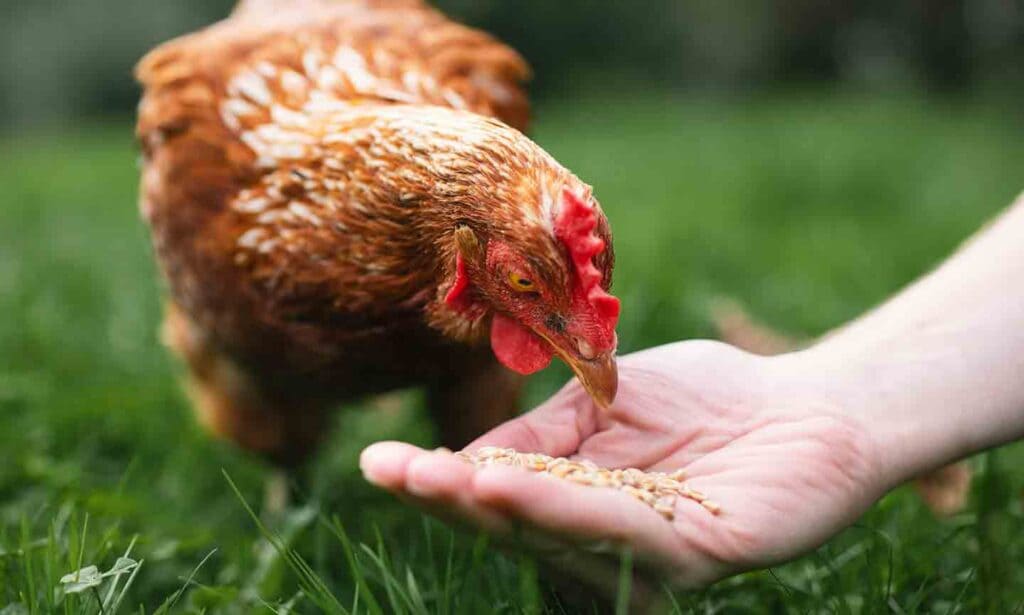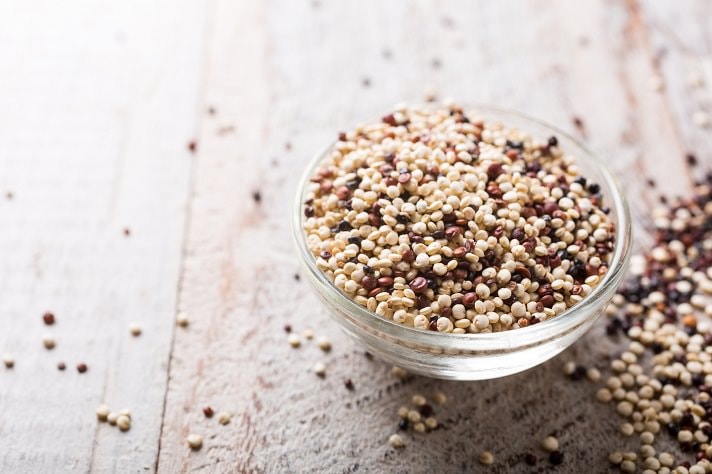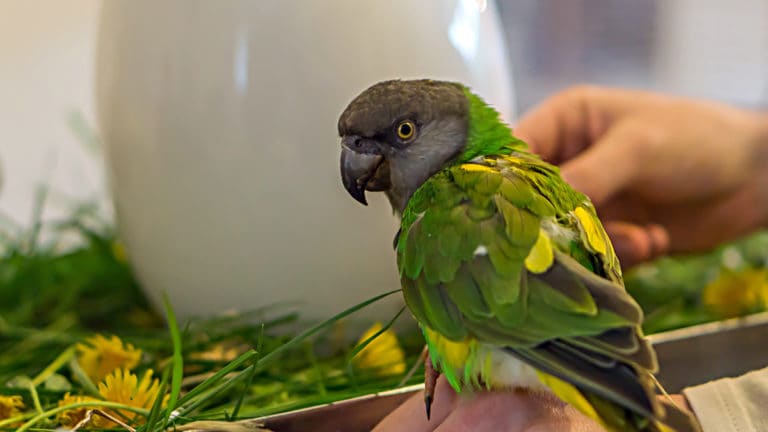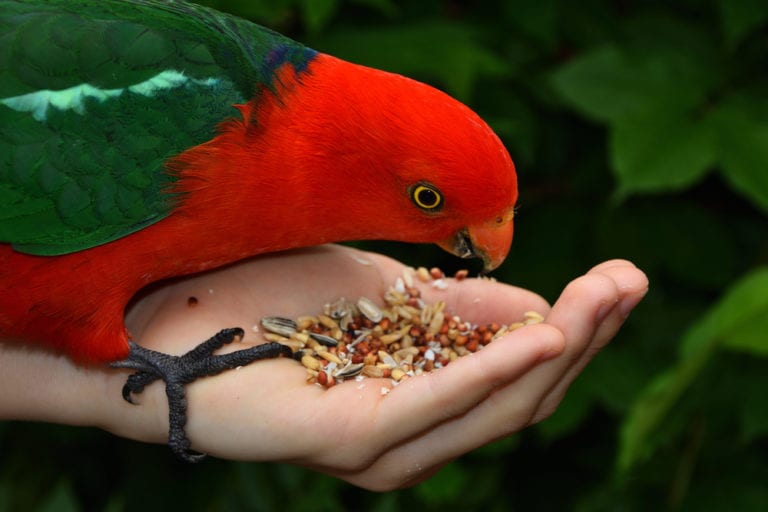In This Guide:
What Do Chickens Eat?
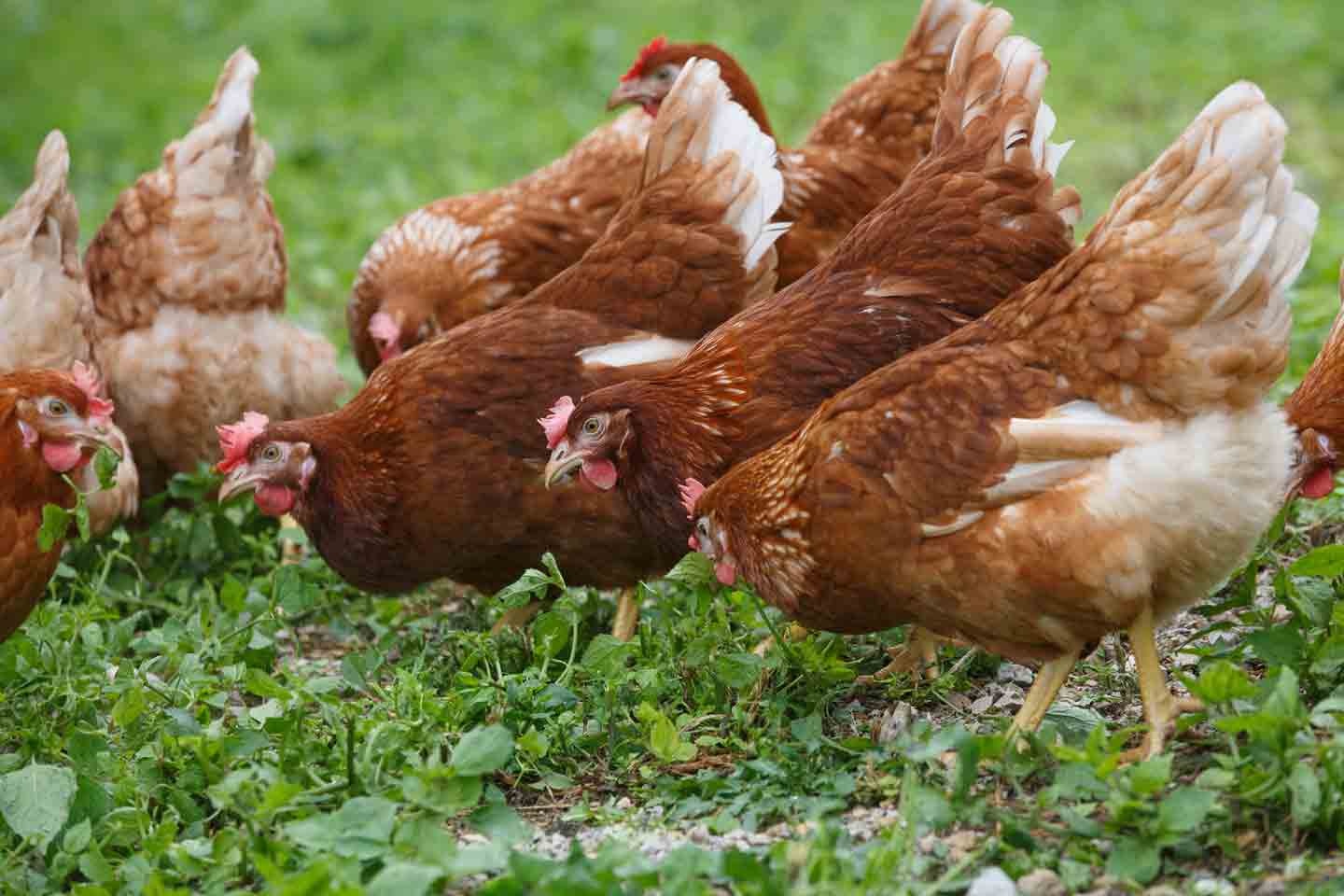
Adult chickens are omnivores that should eat a combination of mostly high-quality layer feed along with a small amount of treats, such as fruits, vegetables, and seeds, says Anthony Pilny, DVM, DABVP (Avian Practice), medical director and director of education programs at the Arizona Exotic Animal Hospital in Phoenix, Arizona.
Free-ranging chickens will also feed on grass, weeds, and bugs, such as mealworms. However, it’s still important to provide them with higher-protein layer feed, even if you’re raising chickens who free-range, since this food is specifically formulated to provide the right balance of essential nutrients. While free-ranging chickens can find a variety of foods like insects, plants, and seeds, it’s generally not enough to meet all their dietary needs.
Did you know? It’s important to feed your birds according to their life stage and type. Chickens aren’t the same as roosters, which have their own diet, and egg-laying hens also require certain nutrients to lay their own eggs. Also, baby chicks require starter feed versus adult layer feed.
What To Feed Chickens
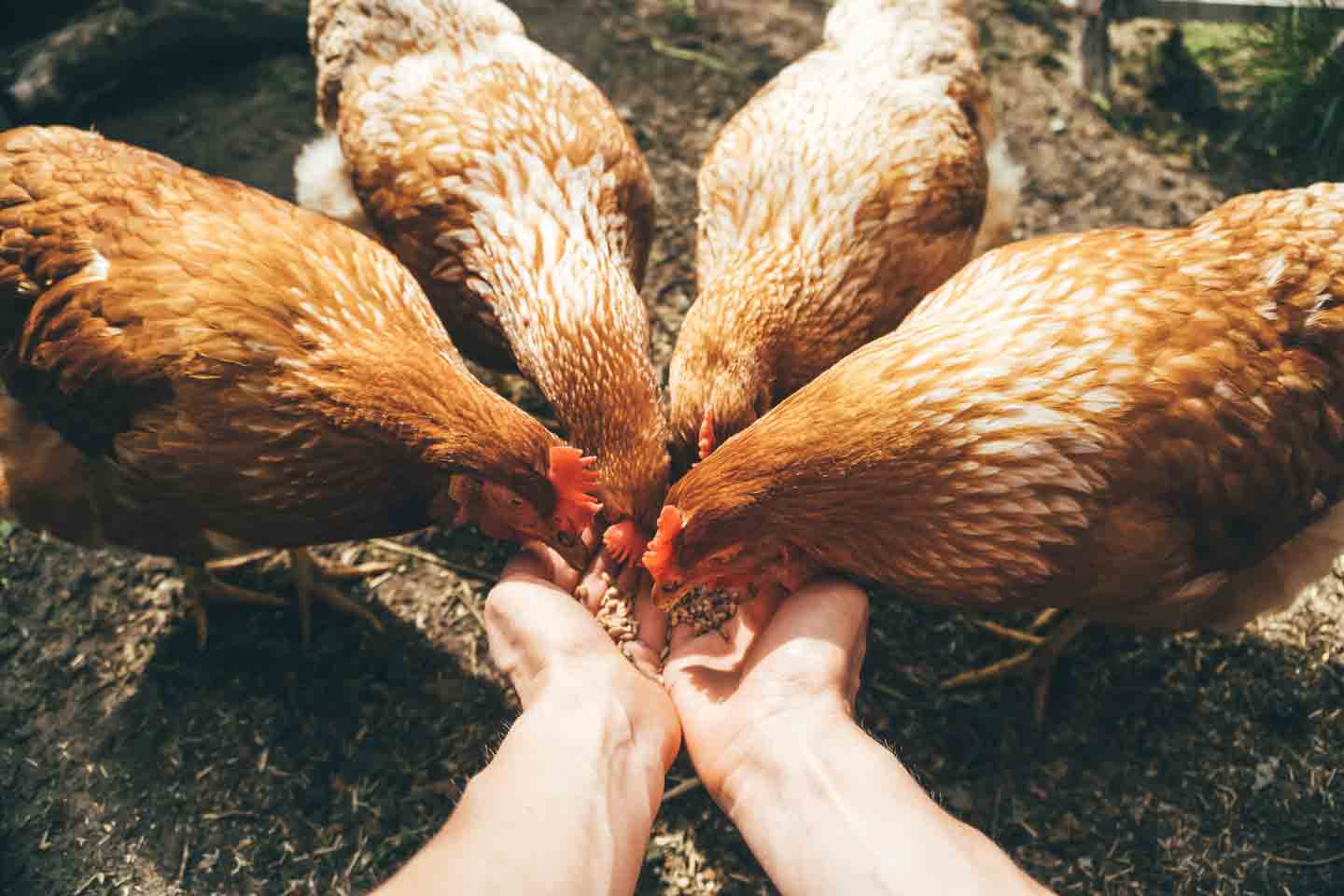
Chickens should eat a balanced diet of primarily layer feed, grass, and bugs from the yard, and chicken treats, like fresh produce scraps. Egg-laying hens also require special supplements to support egg production and promote strong and consistent eggs, and all chickens require “grit” to help them better digest their foods. Let’s get into the details.
Layer Feed
Roughly 90% of an adult chicken’s diet should be a high-quality, balanced layer feed that ensures they get essential amino acids (proteins). Giving your chickens a good-quality commercial feed ensures they get all the nutrients they need to remain healthy and strong, and it also promotes egg laying with nice, strong shells, says Lisa Steele, a fifth-generation chicken keeper in Maine and founder of Fresh Eggs Daily®.
We asked Dr. Pilny and Steele about the best feeds for chickens. Here are their top picks:
Grass and Bugs
If a flock free-ranges, they will also chow down on grass, weeds, and bugs throughout the day. Fortunately, Steele says, healthy chickens won’t overeat; these self-sufficient birds will only consume as much in a day as they need to fulfill their nutrition requirements.
Still, even if your chicken is eating grass, weeds, and whatever leggy grub they can find, you still need to provide them with a high-quality layer feed. When given free choice, they’ll eat a balance of what they need to get the nutrition required for their body.
Fresh Produce Scraps (And Other Treats)
The remaining portion of a chicken’s diet can be healthy treats by way of kitchen scraps like fresh produce, along with some nuts and whole grains. “Chickens can eat a variety of fruits, but their favorites tend to be apples, blueberries, strawberries, and melons,” Dr. Pilny says. “Vegetables like shredded carrots, cabbage, greens, kale, pumpkin, cucumbers, fresh herbs, and grasses are also great for their diet.”
Steele adds that chicken owners can provide these items raw or buy them frozen and defrost them. Chickens can also eat cooked vegetables. You can serve this produce mashed or chopped, or toss your chicken some whole vegetables to give them a tasty treat that’ll keep them busy for a while.
Some additional treats you can try are oatmeal, sunflower seeds, and cracked corn (fed in winter). These foods are meant to be given as rare treats, but they are good for training. Dried grubs and purchased chicken scratch can also be a nice treat.
Approved Treats:
- Apples
- Blueberries
- Strawberries
- Melons, including watermelons
- Carrots
- Cabbage
- Greens
- Kale
- Pumpkin
- Cucumbers
- Fresh herbs
- Sunflower seeds
- Dried grubs
- Oatmeal
- Cracked corn
Grit
Since they don’t have teeth, along with feed chickens require grit—small, hard materials—to help them grind up and digest their food, Steele says. You can buy commercial grit for them, but Steele says that if they free-range at all, they will pick up grit in the form of tiny rocks and stones from the yard. If you provide your chickens a dust bath in their run, they will also pick out any pebbles in that to double as grit.
Supplements
Hens need supplemental calcium to ensure they lay eggs with strong eggshells. “You can either buy commercial crushed oyster shells, or crush and feed their own eggshells back to them,” Steele says. They typically consume about 0.5 to 1 ounce per hen per week as needed.
Aside from that, Dr. Pilny says that the nutritional requirements for chickens are well-known and that most commercial diets meet their needs, including their required vitamins and minerals. Some chicken keepers add a commercial multivitamin, which should only be used in low amounts; omega fatty acids; and probiotics. Talk to your veterinarian before adding any extras to your chickens’ diet.
Foods To Avoid
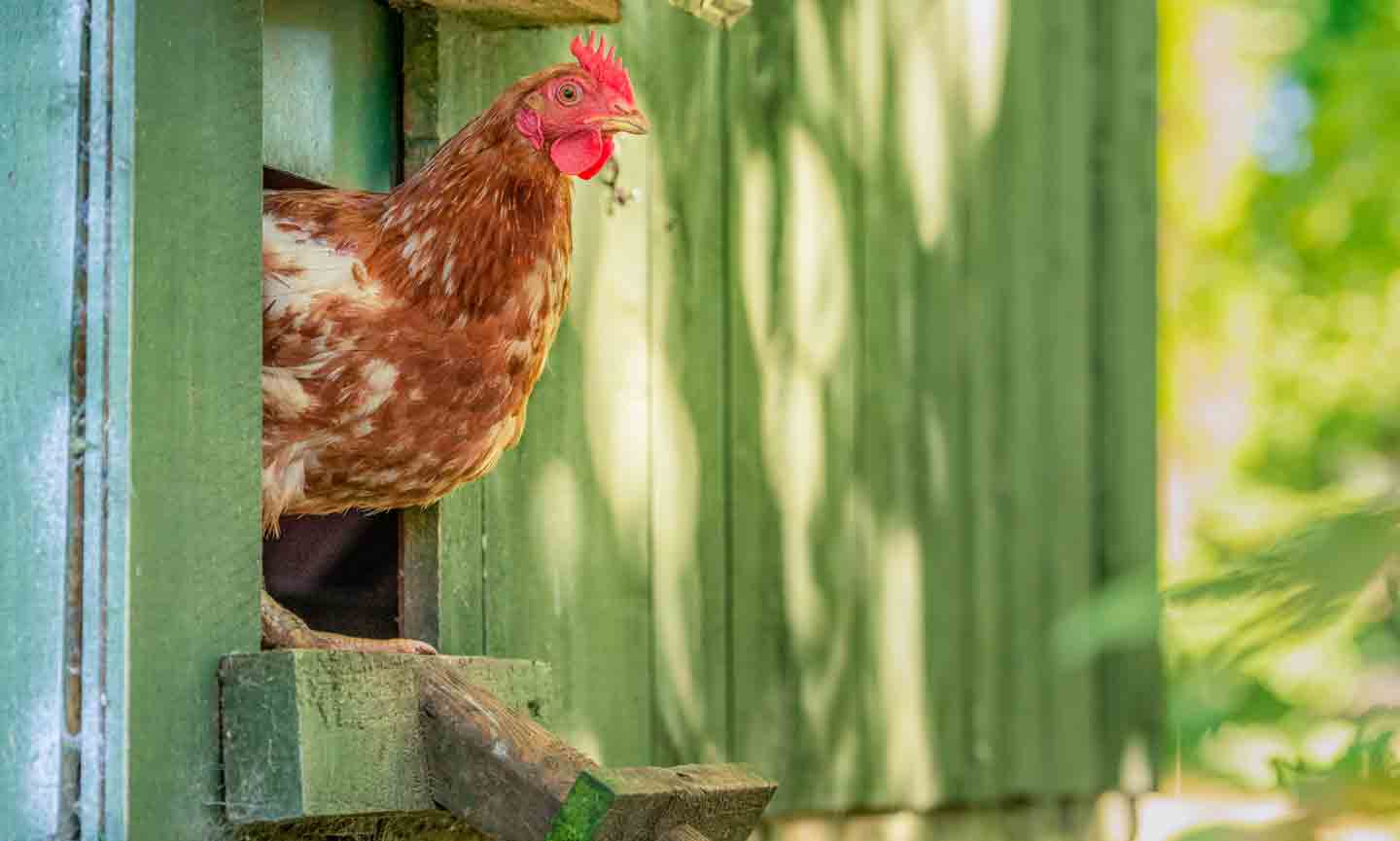
While chickens can eat many different types of foods, Dr. Pilny notes that there are a handful of items you should avoid giving them. Here are the biggest offenders.
- Avocados
- Fruit pits
- Rhubarb
- Chocolate
- Caffeine
- Processed foods
- High-fat foods
- Salty or seasoned foods
- Raw potatoes or potato peels
- Onions
- Raw beans like soybeans
“Some native plants can be toxic, so always check before feeding or allowing free-grazing,” Dr. Pilny adds. He says to also avoid old, moldy, or rotten food items. As big as their appetites are, your sweet chickens aren’t intended to serve as garbage disposals. You’ve got compost for that!
How Much To Feed Your Chickens
Give your chickens layer feed each morning and then again in the afternoon, if needed, Steele says. This daily routine is a good opportunity for you to have some interaction and bonding with your chickens. Each chicken should be given approximately 1/4 to 1/3 pound of layer feed daily to meet their nutritional needs.
Alternatively, Dr. Pilny says you can provide them with a self-service feeder full of layer feed in their chicken coop, which allows them to eat as they need throughout the day. Just make sure to replenish it as it empties so they’re never without food. A potential downside to this method is that exposed food can attract rodents and other animals, so be mindful of this so you don’t have issues with wild birds or other critters joining in on the buffet.
Fresh foods, treats, insects, and other supplements can be fed to your chickens when available, but these items should be removed if not eaten right away, Dr. Pilny says. Ideally, these fresh food treats should not be left for more than a few hours—and definitely not overnight. Fresh water should be readily available at all times too.
FAQs About What To Feed Chickens
Q:What is the best thing to feed chickens?
A:About 90% of an adult chicken’s diet should be a high-quality, balanced layer feed, which you can purchase pre-made at many pet or farming stores. The other 10% of your chicken’s diet can be approved treats, which may include seeds, fruits, and vegetables. They may also graze and eat grass, weeds, and grubs.
Q:What should you not feed chickens?
A:Don’t feed your chickens onions, avocadoes, white potatoes, or the leaves of plants in the nightshade family including tomatoes, peppers, and eggplants. All of these foods contain items that are toxic to chickens. Also avoid any table scraps that are too fatty, sugary, or salty; contain caffeine or chocolate; or are moldy or old.
Q:What to feed chickens for the healthiest eggs?
A:Along with their feed, egg-laying chickens require supplemental calcium to ensure they lay eggs with strong eggshells. You can either buy commercial crushed oyster shells or crush and feed their eggshells back to them.
If you’re keeping chickens, ensuring they have a healthy diet is one of the most important things you can do to help them live a long and healthy life. We also recommend placing them in a proper enclosure with a coop, run, and all the important essentials for each.
Expert input provided by Anthony Pilny, DVM, DABVP (Avian Practice), medical director and director of education programs in Phoenix, Arizona, at the Arizona Exotic Animal Hospital; and Lisa Steele, a fifth-generation chicken keeper in Maine and founder of Fresh Eggs Daily®.
This content was medically reviewed by Chewy vets.
More About Chickens
Share:
